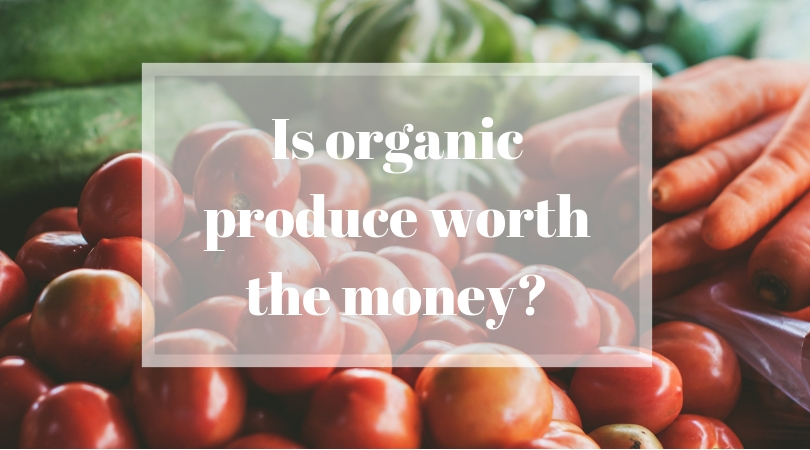A Dietitian Weighs In: Buying organic – yay or nay?
To wrap up our series on Eating Well on a Budget, we’ll address one of the more common questions I get as a dietitian: is it worth spending more money on organic foods?
The answer is complex and individual. There are so many factors to consider – research, finances, and health concerns to name a few. The answer is a personal choice based on your consideration of all of these factors and how they interact in your own life. In an effort to inform those decisions, we will discuss some of the research surrounding these topics.
What Makes Produce Organic?
The USDA allows the use of the term “organic” on produce and products that meet the following criteria:
- produce or ingredients are “…certified to have grown on soil that had no prohibited substances applied for three years prior to harvest. Prohibited substances include most synthetic fertilizers and pesticides.”
- Do not contain artificial preservatives, colors, or flavors
- “Not grown or handled using genetically modified organisms”1
Is Organic Produce Healthier?
Food that meets organic criteria also often touts a higher price tag (49% higher, according to Consumer Reports2). So for the budget- and health-conscious consumer, the question is: does eating organic vs. non-organic foods have a significant impact on my health?
The trickiest part about answering that question is that humans are such complicated critters…it is difficult to tease out the health impacts of something like eating organic produce vs. non-organic produce because in most cases, the effects of that decision would be long-term – some even lifelong. That makes research difficult, because over the course of a lifetime there are so many confounding factors that it is darn near impossible to definitively pinpoint a specific cause or even correlational relationship. For example, since organic produce is more expensive, those who eat organically-grown produce regularly might be more likely to have higher incomes than those who don’t. If there is a difference in health outcomes, could it be due to living in less polluted areas or having better health care? I’m not sure that there will ever be a direct, consistent, and documented difference in many of cases, for that reason.
Instead, what often happens is that research tends to produce a lot of conflicting or confusing results. Here are the findings of a just a handful of different research studies:
- A study of organic vs. non-organically-grown greens found that organically grown spinach had higher concentrations of iron, zinc, and calcium than non-organically grown spinach, but no difference between organically vs. non-organically grown romaine. Non-organic romaine contained higher concentrations of magnesium than organic romaine.3
- In a review of the nutritional content of organic vs. non-organic produce, organic foods were “nutritionally superior” (based on an assessment of the content of antioxidants, vitamins, minerals, nitrates and protein) in 61% of cases, while non-organic produce was “nutritionally superior” in 37% of cases.4
- The USDA’s report on pesticide testing in 2016 found that more than 99.5% of foods tested “well below” benchmark safety levels established by the Environmental Protection Agency.” 22% of the samples had no detectable pesticide residue.5
- Meanwhile, other studies have linked intakes of foods with higher pesticide residues with fertility issues. Non-organic produce with lower pesticide levels had no negative effect on fertility.6, 7
Just a little research muddies the water a bit, doesn’t it?
Is Buying Organic Produce Worth It?
In these cases I keep a mental category of recommendations that I call “common sense” recommendations. These recommendations apply to these complicated situations where research makes things less, rather than more, clear. Common sense would tell us that it is probably best for us to eat in the form in which God provided it to us. Common sense tells us that it is probably best to eat foods that was not grown with chemicals designed to kill other life forms.
That being said, these “common sense” recommendations are not wholeheartedly supported by research, as you saw above. They are not, by any means, hard and fast rules and, as mentioned earlier, there are many factors to consider.
One thing we absolutely know for sure is that eating plenty of fruits and vegetables every day is significantly beneficial for cancer prevention, heart health, reducing inflammation, and so many other health conditions.2 Those benefits exist regardless of whether those fruits and vegetables are organic or not. I can say with certainty that eating several servings per day of non-organic produce is much more beneficial than no produce at all! So that’s where it ultimately comes down to personal choice. You need to balance your own personal health goals with your own personal budget. For those who feel that they would like to limit their exposure to pesticide residues but simply find it beyond what their grocery budget allows, there are a few options:
- Prioritize your purchases: Each year, the Environmental Working Group produces a list of the Dirty Dozen and Clean Fifteen. These are the produce items with the highest and lowest levels of pesticide residue, respectively. If you can’t afford to buy all organically-grown produce, you can prioritize the dirty dozen items as organic to reduce your pesticide exposure.
- Look for a cropshare or a wonky produce subscription: Small family farms and waste prevention programs have created subscription services to purchase local organic produce. Some of these programs feature fruits and vegetables of unusual size or shape that grocery stores don’t want to sell. These programs offer these items at reduced cost to consumers to prevent food waste. Check out Imperfect Produce to see if they provide these services in your area!
- Grown your own: This can certainly be a commitment, but the benefits are so delicious! You’ll enjoy fresh, tasty food grown in your own yard, containers, or window boxes. You can even use SNAP/EBT benefits to purchase seeds for growing. If you’re a total newbie, ask Google or a local librarian to help you find info on growing your own crops of delicious (and very low cost) produce.
You might also like…
Money-Saving Tip: When Good Produce Goes Bad
How to Meal Plan on a Budget (step-by-step walkthrough)
What to do When Your Healthy Plan Falls Through
References
- McEvoy, M. “Organic 101: What the USDA Organic Label Really Means.” U. S. Department of Agriculture. https://www.usda.gov/media/blog/2012/03/22/organic-101-what-usda-organic-label-means.
- “Eat the Peach, Not the Pesticide: Our new produce guidelines show you how to make the best choices for your health and for the environment.” Consumer Reports. https://www.consumerreports.org/cro/health/natural-health/pesticides/index.htm.
- Rose, S. B. et al. “Mineral Content of Organic and Conventionally Grown Spinach and Lettuce.” Journal of the Academy of Nutrition and Dietetics. September 2011. 111:9S. p A45. https://jandonline.org/article/S0002-8223(11)00868-6/pdf.
- Benbrook, C. et al. “New Evidence Confirms the Nutritional Superiority of Plant-Based Organic Foods.” The Organic Center. March 2008. https://www.organic-center.org/reportfiles/5367_Nutrient_Content_SSR_FINAL_V2.pdf.
- “USDA Releases 2016 Annual Pesticide Data Program Summary.” United States Department of Agriculture. February 2018. https://www.ams.usda.gov/press-release/usda-releases-2016-annual-pesticide-data-program-summary.
- Chiu, Y. et al. “Association Between Pesticide Residue Intake and Pregnancy Outcomes Among Women Undergoing Fertility Treatment With Assisted Reproductive Technology.” Journal of the American Medical Association. January 2018. 178:1. p 17-26. https://jamanetwork.com/journals/jamainternalmedicine/article-abstract/2659557?alert=1.
- Chiu, Y. et al. “Fruit and vegetable intake and their pesticide residues in relation to semen quality among men from a fertility clinic. Human Reproduction. June 2015. 30:6. p. 1342-1351. https://www.ncbi.nlm.nih.gov/pubmed/25824023.





Leave a Comment